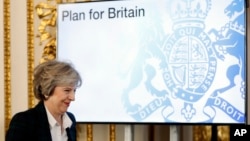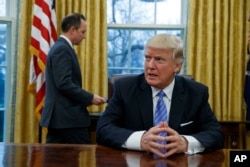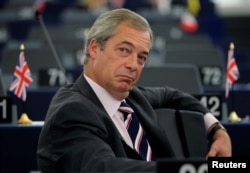Britain's power since 1945 has depended on hugging the United States as hard as it can — the trans-Atlantic partnership between Washington and London has magnified Britain's global clout.
The country's politicians and press fret when there's any perceived chill. Comparisons are made inevitably to the strength of the “special relationship” that ideological allies Margaret Thatcher and Ronald Reagan had.
Since then, the special relationship has had ups and downs, although there was a strong partnership between Prime Minister Tony Blair and President George W. Bush.
Following Bill Clinton's election in 1992, there were reports he was angry with Britain's ruling Conservatives and Prime Minister John Major for allegedly trying to help the Republicans during the presidential race.
The Clinton-Major relationship never warmed and many in Britain was felt the government's clout in Washington diminished.
On Friday in Washington, British Prime Minister Theresa May will become the first foreign leader to meet with U.S. President Donald Trump since the inauguration.
Brexit concerns
Brexit, or Britain's decision to leave the European Union, is just two years away and for all the outward confidence of British officialdom, and talk of how Global Britain will be a huge success, there is alarm. A Britain standing alone will be weakened economically and its global political strength potentially much diminished outside the EU.
The British are eager for a trade deal with the United States to help improve post-Brexit economic prospects. Trump has promised to deliver, but it is not clear how quickly a trade deal can move through Congress.
The British are desperate also to ensure they are seen as America's indispensable partner for the foreseeable future. “The United States is the only game in town for us,” a British official told VOA.
A former British intelligence official said, “The Trump team realizes it needs a good international friend. I think you will see them turning to three countries in particular: Australia, India and most of all Britain,” he said, speaking on condition of anonymity.
Britain remains committed to NATO, seeing it as the bedrock of Western security. During the presidential campaign and since his election, Trump has questioned the military alliance's relevance, recently dubbing it “obsolete.”
Trump is unpopular in Britain, and May's ruling Conservative Party is wary of him, worried that a close association could tarnish them.
Trump-Farage relationship
Conservative wariness has grown because of the ties developing between the Trump team and Nigel Farage, a key figure in last year's Brexit referendum campaign and a founding member of Britain's United Kingdom Independence Party, which remains a threat to the Conservatives.
On Thursday night at a lavish Washington inauguration party attended by Farage and other Brexiters, Mississippi Governor Phil Bryant, a key Trump ally, said Farage would be an informal adviser to Trump about Britain.
“I don't want to speak for the president, but I know that the president has a great deal of trust in Nigel Farage, and I think he is going to turn to him as an adviser and there would be none better,” Bryant said. He added “There's an opportunity for him to work directly with the president; we call it ‘close but unofficial.’”
Downing Street fears Farage's influence will be stronger with Trump than May's.
Another complexity for May, say British officials, comes with Trump's determination to improve relations with Moscow, including a possible lifting of Western sanctions on Russia in return for nuclear arms reductions and the possibility of accepting the 2014 Russian annexation of Crimea.
Change on Crimea?
Last week in Kyiv, British Defense Secretary Michael Fallon said Britain will stand alongside Ukraine in its confrontation with Russia because freedom cannot be “traded.” He announced new British military training for Ukrainian forces battling Russian-backed separatists and said a Royal Navy warship will visit the country soon.
Still, a former senior British intelligence official said he could see the British government accepting Russia's annexation of Crimea, if pushed by Trump. “We may well have to accept the annexation,” he said. “The tectonic plates have shifted.”
May told the BBC Trump has said he wants “a very strong relationship between the U.K. and the U.S.,” but, she insisted she would stand up to him when it comes to issues on which they disagree.
“It is going to be a difficult balancing act for May,” a senior British official told VOA.






